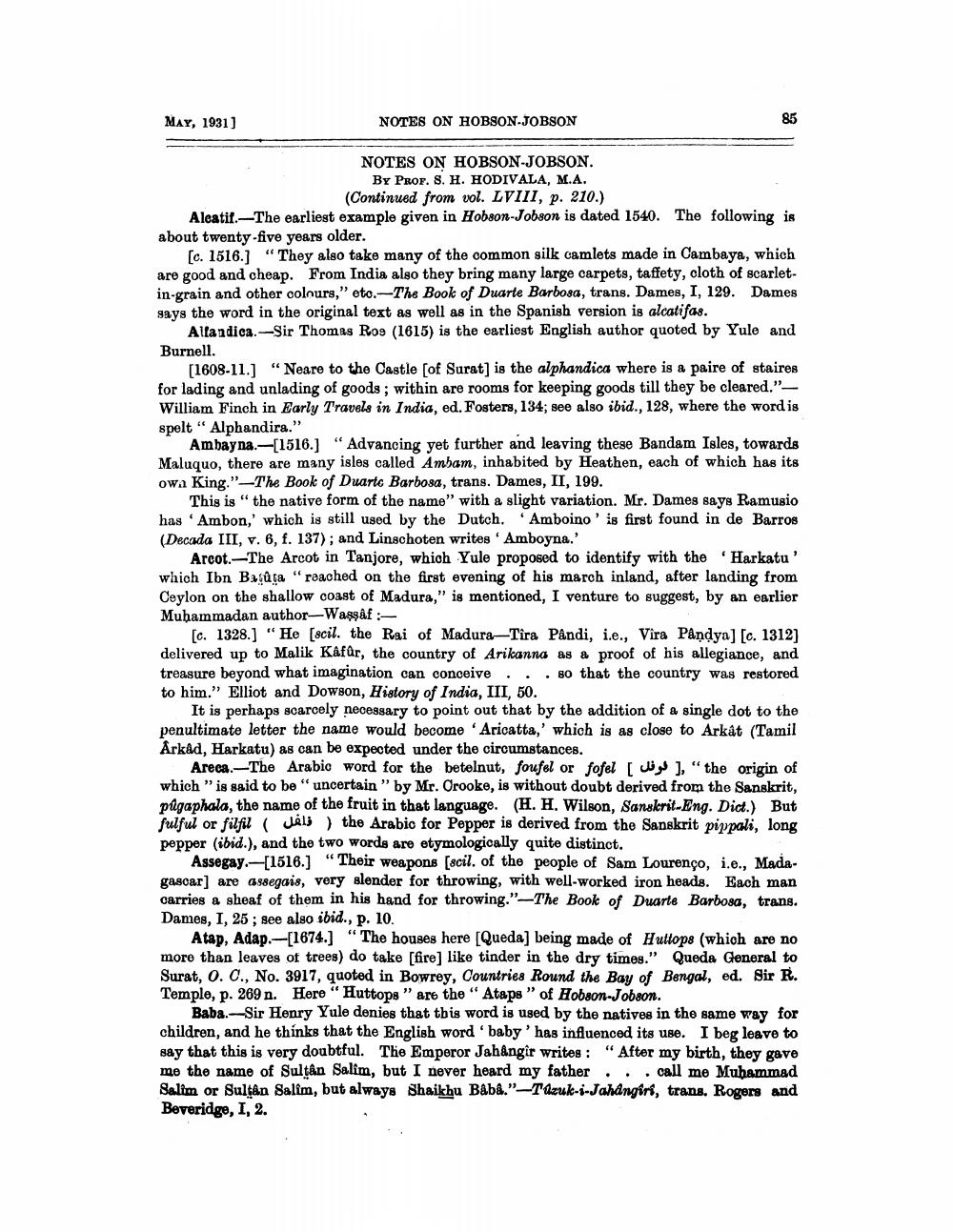________________
MAY, 1931)
NOTES ON HOBSON-JOBSON
NOTES ON HOBSON-JOBSON.
BY PROF. S. H. HODIVALA, M.A.
(Continued from vol. LVIII, p. 210.) Aleatit.-The earliest example given in Hobson-Jobson is dated 1540. The following is about twenty-five years older.
[c. 1516.) “They also take many of the common silk camlets made in Cambaya, which are good and cheap. From India also they bring many large carpets, taffety, cloth of scarletin-grain and other colours," eto.-The Book of Duarte Barbosa, trans. Dames, I, 129. Dames says the word in the original text as well as in the Spanish version is alcatifas.
Allandica.--Sir Thomas Ros (1615) is the earliest English author quoted by Yule and Burnell.
[1608-11.] "Neare to the Castle [of Surat) is the alphandica where is a paire of staires for lading and unlading of goods; within are rooms for keeping goods till they be cleared." - William Finch in Early Travels in India, ed. Fosters, 134; see also ibid., 128, where the word is spelt "Alphandira."
Ambayna.-[1516.) "Advancing yet further and leaving these Bandam Isles, towards Maluquo, there are many isles called Ambam, inhabited by Heathen, each of which has its owa King."-The Book of Duarte Barbosa, trans. Dames, II, 199.
This is "the native form of the name" with a slight variation. Mr. Dames says Ramusio has 'Ambon,' which is still used by the Dutch. 'Amboino 'is first found in de Barros (Decada III, v. 6, f. 137); and Linschoten writes Amboyna.'
Arcot. -The Arcot in Tanjore, which Yule proposed to identify with the Harkatu' which Ibn Bafûta "reached on the first evening of his march inland, after landing from Ceylon on the shallow coast of Madura," is mentioned, I venture to suggest, by an earlier Muhammadan author-Wanaf :
fo. 1328,1 "He [scil. the Rai of Madura-Tîra Pandi, i.e.. Vira Påndyal c. 1312) delivered up to Malik Kâfâr, the country of Arikanna as a proof of his allegiance, and treasure beyond what imagination can conceive ... 80 that the country was restored to him." Elliot and Dowson, History of India, III, 50.
It is perhaps scarcely necessary to point out that by the addition of a single dot to the penultimate letter the name would become 'Aricatta,' which is as close to Arkát (Tamil Arkad, Harkatu) as can be expected under the circumstances.
Areca.-The Arabic word for the betelnut, foufel or fofel [ I ], "the origin of which " is said to be "uncertain " by Mr. Orooke, is without doubt derived from the Sanskrit, púgaphala, the name of the fruit in that language. (H. H. Wilson, Sanskrit-Eng. Dict.) But fulful or filfil ( JÁLS) the Arabic for Pepper is derived from the Sanskrit pippali, long pepper (ibid.), and the two words are etymologically quite distinct.
Assegay.- [1516.) “Their weapons (scil. of the people of Sam Lourenço, i.e., Madagascar) are assegais, very slender for throwing, with well-worked iron heads. Each man carries a sheaf of them in his hand for throwing."-The Book of Duarte Barbosa, trans. Dames, I, 25; see also ibid., p. 10.
Atap, Adap.- [1674.] "The houses here [Queda) being made of Hullops (which are no more than leaves of trees) do take [fire) like tinder in the dry times." Queda General to Surat, 0. C., No. 3917, quoted in Bowrey, Countries Round the Bay of Bengal, ed. Sir R. Temple, p. 269 n. Here " Huttops" are the "Ataps " of Hobson-Jobson.
Baba.--Sir Henry Yule denies that this word is used by the natives in the same way for children, and he thinks that the English word 'baby' has influenced its use. I beg leave to say that this is very doubtful. The Emperor Jahangir writes : "After my birth, they gave me the name of Sultan Salim, but I never heard my father... call me Muhammad Salim or Sultan Salim, but always Shaikhu Baba."-T azuk-i-Jahangiri, trans. Rogers and Beveridge, I, 2.




